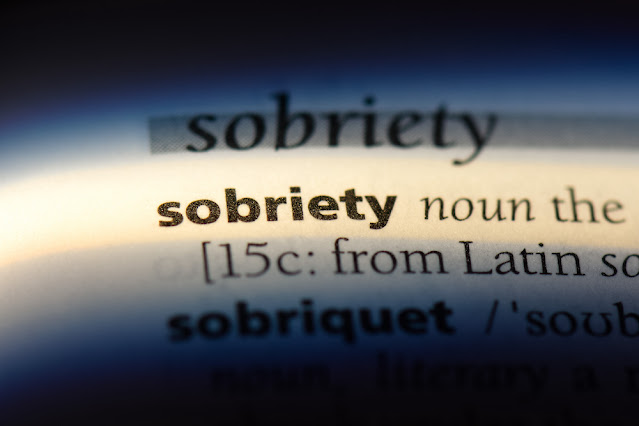Definition of Sobriety
The dictionary definition of sobriety is “the state of being sober,” and the dictionary definition of sober is “not drunk or affected by alcohol, free from alcoholism, not a habitual drinker; serious, staid, muted, solemn, and/or sensible.” Which is fine for covering all bases if your interest in sobriety is purely scholarly; but if you have personal investment in finding freedom from alcoholism (or any other addiction), sobriety is better understood as a mindset and a way of life.
Let’s take a closer look at the “sobriety” aspects listed above.
Not Drunk
Even the most alcohol-dependent achieve this particular state of sobriety on a regular basis, so it’s of limited use in determining when alcohol is a problem for any individual. While frequent “drunken” episodes are certainly reasonable cause to suspect addiction, many people who never seem drunk are nonetheless addicted. (See next point.) And even someone who isn’t strictly impaired may have consumed enough alcohol to adversely affect performance.
Not Affected by Alcohol
This form of “sobriety” sounds like a good thing, but often it’s a red flag. People with addiction, or alcohol abuse disorder, have built up physical tolerance for “normal” amounts of alcohol, so they are more able to consume large amounts without obvious effects.
Not a Habitual Drinker
Since “habitual” is a subjective term, this is a poor criterion for judging who is living in an overall state of sobriety and who isn’t. It’s a common myth that everyone with alcoholism drinks daily: in fact, there’s a subcategory of alcohol dependence characterized by drinking primarily on weekends. Almost any drinker who is embarrassed to share details, or can’t imagine skipping a regular drink for anything, has a toxic habit regardless of actual drinking patterns.
Serious, Staid, Muted, Solemn
Sadly, regardless of context, many people hear the same negative implications in all the above words: dull, colorless, no fun, less than happy, even living under a cloud of depression. Which is how too many people with addiction visualize a future of physical sobriety: however miserable their lives may be when centered around the bottle, they fear a bleak, comfortless future should they stop drinking. Even after detoxing and starting down the sobriety path, most people are troubled for months by yearnings to “go back to Egypt” when life gets stressful and memory sees only the comfortable parts of the old slavery. Escaping this temptation requires advance planning, strong accountability—and a positive understanding of how fulfilling life can be without drugs. In reality, sobriety is an amazing chance to find a happier, more vibrant life.
Sensible
The least negatively viewed of the synonyms for emotional sobriety, this can still seem less than desirable to those who favor excitement and challenge. Common sense doesn’t have to be incompatible with adventure, though. Common sense—or wisdom—is what creates a focused mindset for accomplishment, and keeps a legitimate drive for achievement/challenge/fulfillment from degenerating into pointless striving for instant gratification. By far the best way to approach a healthy challenge is through a purposeful approach that uses your experience and natural gifts to benefit the larger world—a principle alluded to in the last of the classic 12 Steps: “Having had a spiritual awakening as the result of these steps, we tried to carry this message to [other] alcoholics, and to practice these principles in all our affairs.”
Sobriety: Free From Alcoholism
The key word is “free,” which properly has not only positive but proactive connotations. There’s far more to sobriety, and to freedom, than the absence of the undesirable: a long-term lifestyle of true sobriety comprises multiple active elements.
- It means accepting your circumstances and making the best of them.
- It means taking responsibility for your actions and your life.
- It means cultivating and contributing to meaningful relationships with your family, your friends, and your God.
- It means taking care of yourself physically, emotionally, and spiritually.
- It means discovering your purpose and working to achieve it through your goals, your vocation, and your relationships.
- And it means becoming the best possible version of your uniquely created self, and living in faith that a clearheaded (sober) view of life includes confidence that things will work out for the best.
California Faith-Based Drug and Alcohol Addiction Treatment
Please contact Celebrate Hope to learn more about our faith-based addiction treatment program. Our team will help you break the cycle of addiction and discover the blessings of permanent sobriety. We rely on the teachings of Jesus Christ, along with evidence-based therapies to get individuals on the path of recovery.









